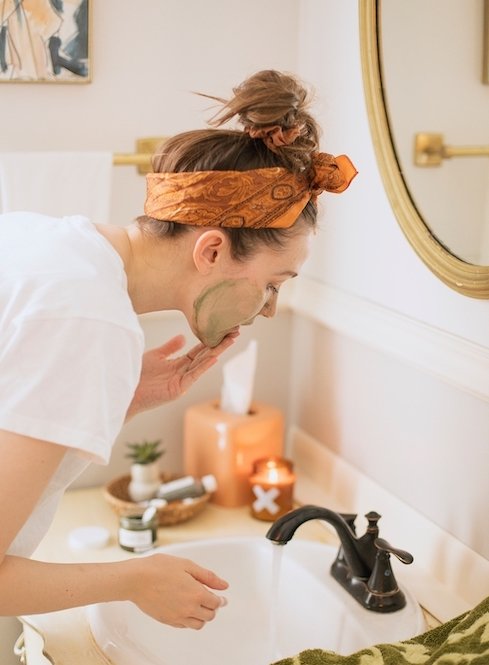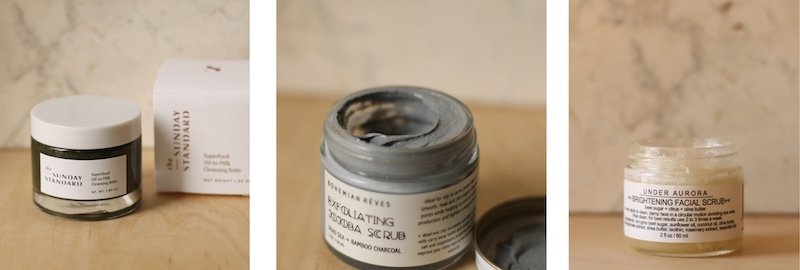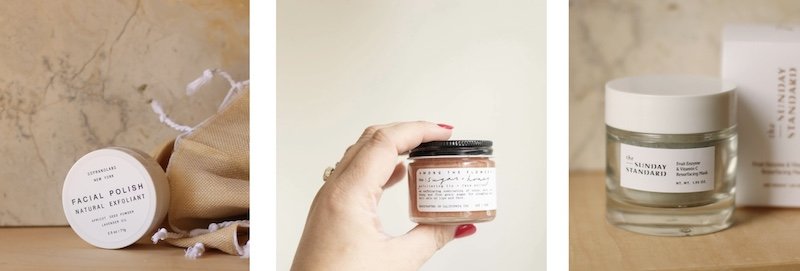Why & How to Exfoliate + Our Top Product Picks
Simply put, exfoliating helps to keep your skin silky soft and smooth by buffing away and removing dead skin cells. Your skin naturally sheds dead skin cells every 30 days or so. When this happens, new skin cells form the top layers of your skin. Exfoliation helps that process by using gentle abrasive scrubs or cloths to help remove those dead skin cells. It recommend by dermatologists to exfoliate your face and body several times a week depending on your skin type and sensitivity.
Two Types of Exfoliation
“ 1. Mechanical: Mechanical exfoliation typically employs a tool (like an oscillating cleansing brush or even a washcloth) or face scrub to physically remove the dead skin cells. Dr. Shah says that if you go the scrub route, the finer the particle, the better off you’ll be because they’re less abrasive. (Think: sugar scrubs and rice enzyme powders.)
> Here at Dune we carry the mechanical exfoliants like scrubs and tools, well get back to this!
2. Chemical: Chemical exfoliators, on the other hand, use alpha hydroxy acids (AHAs) - or beta hydroxy acids (BHAs) (think: a face wash with salicylic acid or a facial peel pad or moisturizer with glycolic acid) to dissolve the sticky glue that holds these cells together, says Dr. Shah. According to Dr. Shah, retinoids can also be considered exfoliants, since they also work to increase cell turnover. “I find that if people are using retinoids, they don’t really need to exfoliate on top of that,” she says.The Benefits to Exfoliating Regularly “
> We currently don’t carry these chemical products and believe the best way to have this exfoliant process is with a dermatologist or esthetician, someone who specializes in serious skin care.
via Womens’s Health
WHY IT’S IMPORTANT
REDUCES THE SYMPTOMS OF ACNE AND HORMONAL BREAKOUTS
If you have acne prone skin or you fall victim to monthly hormonal breakouts, exfoliation is a must for you. Regular exfoliating will help to gently remove the build-up of dead skin cells that block your pores and cause those annoying breakouts. This goes for your face and your body.
IMPROVEMENT OF SKIN TEXTURE
Exfoliating encourages the skin renewal process and makes way for your new healthy cells to shine through. Your complexion transforms from rough and dull to soft and glowing.
CHALLENGING THE AGING PROCESS
As you age, you may notice your skin gradually becoming rougher. This is caused by a build-up of multiple layers of dead skin cells that have accumulated over time. Exfoliating your skin helps to retain its healthy glow as you mature.
IMPROVED MOISTURE ABSORPTION
When layers of dead skin cells build up, it’s difficult for your new skin to properly absorb the nourishing moisturisers and serums you apply every day. Regular exfoliating will ensure you are reaping the benefits of your regular skin and sun care routine.
Via Nivia.com
How to Exfoliate Your Face : Tips from A Dermatologist
We were researching and found this article to be so spot on and easy to follow. The article below is fro Women’s Health- link here to full article.
“ As a general rule, less is more. The goal is NOT to turn beet-red or to feel a sting—it’s to gently help along your body’s natural exfoliation process so that your face glows. As for specifics on how often you should exfoliate, it depends on your skin type.
For sensitive skin: According to Dr. Shah, people with sensitive skin usually have trouble finding facial skin-care products that aren’t irritating. Their skin tends to turn red and often gets itchy, she explains. If that sounds like you, she advises skipping exfoliation altogether. But if you feel like you have to exfoliate, just use a creamy cleanser with a low percentage of glycolic acid once a week, she says.
For oily skin: People with oily skin might see a fine sheen on their face pretty early into the day, according to Dr. Shah. “And if you’re prone to acne, or you feel like your pores get clogged often, that’s usually an indication of excess sebum production, which is associated with oily skin,” she says. If you do have oily skin, you have a lot more freedom with your regimen—Dr. Shah says you can exfoliate up to four times per week (just make sure you work up to it over time), and your skin can probably tolerate both chemical and mechanical exfoliation. One option for your regimen, according to Dr. Shah, is to use an AHA-based cleanser two to three times per week and a facial peel pad once per week. Alternatively, you might work up to using a retinoid every day.
For normal to combination skin: Dr. Shah advises exfoliating twice per week by using a retinoid or an AHA or BHA cleanser.
When should you skip exfoliation?
If you're mid-breakout, you might be tempted to go to town with exfoliants—but you should actually avoid abrasive mechanical methods. “I see exfoliation in a lot of my acne patients doing more harm than good,” Dr. Shah says.
Why? If you have cystic or chronic acne, your skin is already inflamed. So irritating it further with harsher exfoliants can leave behind dark marks known as post-inflammatory hyperpigmentation. The marks can last even longer (and happen more often) in people who have tan to deeper skin tones, Dr. Shah adds. As for chemical exfoliants, they can help in some cases, she explains, but it’s best to get advice from your dermatologist before going for it, because you’ll want to take a more nuanced approach to your exfoliation regimen.
Other times you should hold off on exfoliation: when you have any kind of cut or open wound on your face, if you have an infection on your face like a cold sore (it'll spread!), or if you're sunburned. Moisturizer and TLC is more of what your skin needs during those times. “
Our facial exfoliant picks: The Sunday Standard Cleansing Balm is both a cleaner and exfoliator, we love the double duty! The following four scrubs are all grit based scrubs with sugar and essential oils. The last exfoliant we carry is the only Chemical exfoliant created by The Sunday Standard; it uses fruit enzymes and vitamin C to resurface your skin.
WHY DRY BRUSHING FOR YOUR BODY?
Detoxifying the skin
The mechanical action of dry brushing is excellent for exfoliating rough, dry skin, she says. “Dry brushing unclogs pores in the exfoliation process. It also helps detoxify your skin by increasing blood circulation and promoting lymph flow/drainage,” says Dr. Khetarpal. Also, by unclogging pores, it’s easier for the body to sweat and eliminate toxins in your system.
Stimulating the nervous system
Dry brushing can make you feel good since it has the additional benefit of stimulating your nervous system. It can also leave you feeling invigorated like a massage often does.
Giving your skin a more radiant glow
Removing dead skin cells can help make your skin smoother and softer. It can also give your skin a brighter appearance temporarily.
Gentler on your skin than scrubbing in the shower
Hot water inflames your skin and even strips away oils, fats, and proteins that keep your skin healthy. This can cause redness and itching. Brushing your skin while it is dry allows you to exfoliate and increase blood circulation without robbing it of moisture the way the hot water in your shower can.
via Cleveland Clinic
THE BEST TIME TO DRY BRUSH
The best time to dry brush is just before a shower. Then you can wash off any dead skin cells and flaky skin. Be sure to apply lotion afterward to put moisture back into your skin.
How do I dry brush my skin?
If you’re new to dry brushing or not sure if you’ve been doing it correctly, Dr. Khetarpal offers these tips:
Using a natural bristled brush, start from the feet or ankles and work your way upward in long, fluid strokes on limbs.
Next, move the brush in a circular motion on your torso and back.
Since this process can be a little too much for sensitive areas like the abdomen, breasts and neck, lighten up the pressure as needed.
A few overlapping swipes per area is all you need. If you go over the same area for too long, you can cause irritation or bleeding.
Dry brush once a day and shower immediately afterward.
Via Cleveland Clinic
Our body exfoliation picks: We love the agave fiber loofas and cloths because they have more texture then your typical washcloth and is gentle on your skin. The triple mint pumice soap is another favorite as you can exfoliate and cleanse in one! The agave soap bag lets your turn any of your favorite bars into an exfoliating bar too.





